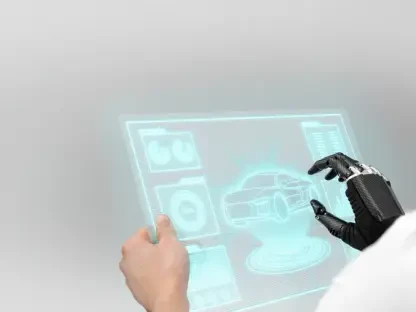Imagine a world where game developers can craft intricate 2D and 3D worlds not from a powerful desktop setup, but directly from the palm of their hand during a morning commute or a quick coffee break. This scenario is no longer a distant dream, thanks to Xogot, a mobile adaptation of the renowned open-source Godot engine tailored for iPhone and iPad. Developed by Xibbon, a company led by tech industry veterans Miguel De Icaza and Joseph Hill, Xogot is redefining the boundaries of game development by making it accessible on portable Apple devices. This review dives into the transformative potential of this technology, exploring how it empowers creators in a mobile-driven era.
Understanding Xogot and Its Purpose
Xogot stands as a pioneering tool designed to bring the robust capabilities of the Godot engine to iOS platforms, specifically targeting iPhone and iPad users. Its core mission is to democratize game development by allowing creators to build, edit, and test games without being tethered to traditional desktop environments. This shift aligns with the growing reliance on mobile devices for both productivity and creative tasks, catering to a new generation of developers who value flexibility.
The brainchild of Xibbon, Xogot reflects a deep understanding of the evolving tech landscape. With industry leaders like De Icaza and Hill at the helm, the project taps into a vision of touch-based creativity that feels personal and intuitive. Their focus on Apple’s ecosystem underscores a commitment to delivering a polished, native experience, setting the stage for a significant leap in how game development is perceived and practiced on mobile devices.
Key Features and Technical Strengths
Robust Tools for 2D and 3D Creation
One of Xogot’s most striking attributes is its comprehensive support for both 2D and 3D game development, mirroring the depth of desktop-grade tools. Features like tile maps, a dedicated 2D engine, advanced 3D scene systems, and sophisticated lighting options enable developers to construct detailed game worlds directly on their iOS devices. This capability is a game-changer for those who need to iterate on ideas without access to bulkier hardware.
The significance of these tools cannot be overstated, as they bridge a critical gap between mobile convenience and professional-grade functionality. Developers can now sketch out levels or experiment with visual effects while on the move, ensuring that inspiration isn’t lost to the constraints of location or equipment. Xogot essentially transforms an iPad or iPhone into a portable studio, pushing the envelope of creative freedom.
Seamless iOS Integration and Workflow Adaptability
Beyond its development tools, Xogot excels with a native iOS code editor equipped with debugging functionalities, optimized Metal rendering for Apple GPUs, and effortless synchronization with desktop Godot versions. These elements ensure that projects remain consistent across platforms, allowing developers to switch between mobile and desktop setups without missing a beat. Such integration is vital for maintaining productivity in dynamic work environments.
Additionally, Xogot supports external accessories like Bluetooth controllers and keyboards, enhancing its utility for testing and refining gameplay mechanics. The embedded game view for instant playtesting further streamlines the process, offering immediate feedback on changes. This level of workflow flexibility positions Xogot as a versatile companion for developers seeking efficiency in varied settings.
Milestones and Industry Relevance
Xogot’s journey began with an iPad launch earlier this year, marking a significant step toward mobile-first game development. Its subsequent expansion to iPhone showcases Xibbon’s dedication to refining the user experience, leveraging SwiftUI for an interface that adheres to Apple’s design standards. This progression highlights a meticulous approach to crafting a tool that feels inherently at home on iOS devices.
In the broader context of creative industries, Xogot aligns with a noticeable trend of mobile-first solutions gaining traction. Similar to how tools like Logic Pro and Procreate have revolutionized music production and digital art on mobile platforms, Xogot pioneers a comparable shift in game development. It taps into a growing demand for professional-grade applications that cater to users who rely solely on smartphones or tablets for their work.
This trend is particularly relevant as mobile devices become primary computing tools for many, especially in regions with limited access to desktops. Xogot’s arrival signals a pivotal moment, positioning it as a frontrunner in adapting complex creative processes to the constraints and opportunities of portable technology. Its Apple-centric focus further sharpens its appeal in a market hungry for tailored solutions.
Practical Applications and Developer Scenarios
Xogot shines in real-world scenarios where mobility is key, enabling developers to tweak level designs or experiment with shaders during a subway ride or a quiet moment at a café. Its design supports quick adjustments and ideation, making it an ideal tool for capturing fleeting creative sparks without the need for a full workstation. This accessibility fosters spontaneity in the development process.
Rather than aiming to replace desktop environments, Xogot serves as a complementary asset, fitting into hybrid workflows where mobile and traditional setups coexist. For instance, a developer might outline a game concept on an iPad while traveling, then refine it on a desktop later. Such adaptability ensures that Xogot meets the diverse needs of modern creators who juggle multiple environments.
The tool’s utility extends to casual developers or hobbyists who may lack access to high-end hardware. By lowering the entry barrier, Xogot empowers a wider audience to engage with game development, fostering a more inclusive community. Its role in bridging gaps between professional and amateur creators underscores its practical value in everyday contexts.
Challenges in Mobile Game Development
Despite its innovations, Xogot faces inherent challenges tied to mobile hardware limitations. Screen size, for instance, can pose difficulties for intricate tasks, while processing power on iPhones and iPads may not match that of dedicated desktops. These constraints suggest that while Xogot is powerful, it may not fully replicate the depth of a traditional setup for complex projects.
Xibbon’s initial skepticism about the feasibility of game development on smaller devices like the iPhone also reflects broader concerns within the industry. However, targeted use cases—such as quick edits or specific design tweaks—have proven effective in overcoming these doubts. This approach indicates that Xogot thrives in niche applications rather than as a universal solution for all development needs.
Another notable limitation is its exclusive focus on Apple’s ecosystem, with no plans for an Android version. While this decision allows for a highly optimized experience on iOS, it restricts Xogot’s reach in a diverse mobile market. Developers outside the Apple sphere must look elsewhere, highlighting a trade-off between specialization and broader accessibility in Xogot’s current strategy.
Outlook for Xogot and Mobile Creativity
Looking ahead, Xogot holds immense potential to expand its influence among mobile-first developers, particularly as updates and enhancements roll out over the coming years from 2025 onward. Future iterations could address existing limitations, such as processing constraints, by leveraging advancements in Apple hardware or introducing new features tailored to touch interfaces. This trajectory promises to solidify its standing in the industry.
The long-term vision, inspired by Miguel De Icaza’s emphasis on tactile interaction, suggests a deeper shift toward touch-based workflows in game development. As mobile devices evolve, Xogot could play a central role in redefining how creators engage with their craft, making game design more personal and immediate. This perspective hints at a cultural transformation in creative processes over time.
Moreover, Xogot’s impact may extend beyond individual developers to influence educational initiatives and community projects. By democratizing access to game development tools, it could inspire a new wave of talent, particularly among those without traditional resources. Its evolution will likely shape discussions on accessibility and innovation in the broader tech landscape for years to come.
Final Thoughts and Next Steps
Reflecting on the evaluation, Xogot proved to be a groundbreaking tool that brought accessibility, technical depth, and native Apple integration to the forefront of mobile game development. Its flexible pricing model, with free and Pro versions, further cemented its appeal to a wide range of users. The journey through its features and real-world applications revealed a technology that, while not without challenges, carved a unique niche in a desktop-dominated field.
Moving forward, developers and enthusiasts are encouraged to explore Xogot as a supplementary tool, integrating it into hybrid workflows to maximize its strengths. Xibbon’s ongoing commitment to refinement suggests that staying updated on new releases and features will be crucial for leveraging its full potential. Engaging with community initiatives, such as Game Jams supported by Xogot, also offers a pathway to deepen skills and connections.
As mobile computing continues to advance, the industry is poised to witness further innovations inspired by Xogot’s model. Stakeholders are advised to consider how touch-based tools could integrate into broader educational and professional frameworks, potentially reshaping training and mentorship in game development. This forward-looking approach ensures that Xogot’s influence extends beyond its current capabilities, paving the way for a more inclusive and mobile-centric creative future.









